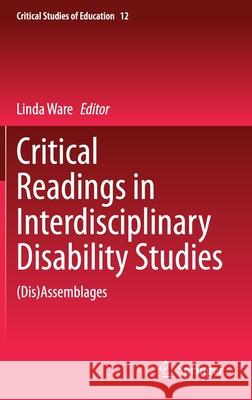Critical Readings in Interdisciplinary Disability Studies: (Dis)Assemblages » książka
topmenu
Critical Readings in Interdisciplinary Disability Studies: (Dis)Assemblages
ISBN-13: 9783030353070 / Angielski / Twarda / 2020 / 223 str.
Kategorie:
Kategorie BISAC:
Wydawca:
Springer
Seria wydawnicza:
Język:
Angielski
ISBN-13:
9783030353070
Rok wydania:
2020
Wydanie:
2020
Numer serii:
000619426
Ilość stron:
223
Waga:
0.51 kg
Wymiary:
23.39 x 15.6 x 1.42
Oprawa:
Twarda
Wolumenów:
01
Dodatkowe informacje:
Wydanie ilustrowane











